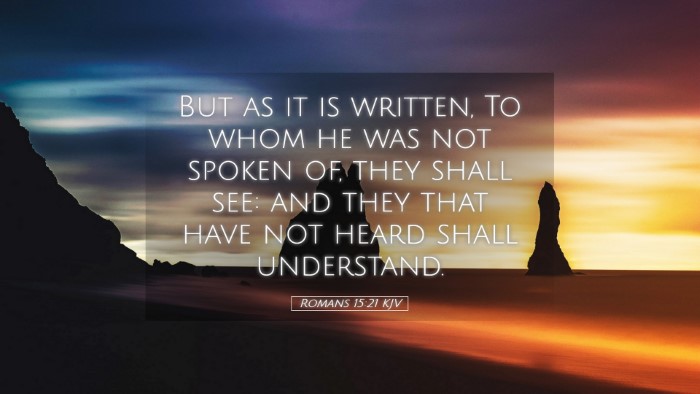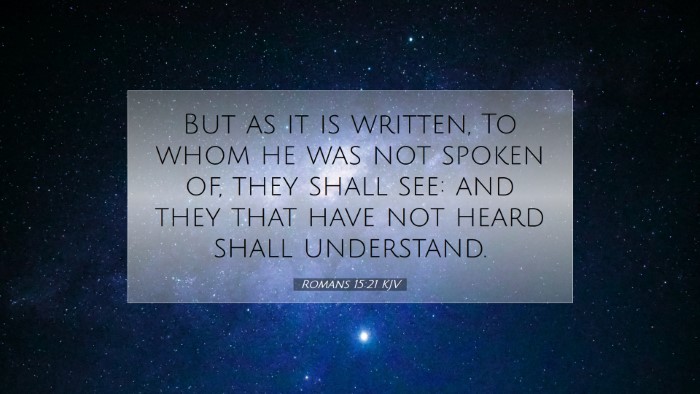Commentary on Romans 15:21
Romans 15:21 states:
"But as it is written, To whom he was not spoken of, they shall see: and they that have not heard shall understand."
Contextual Background
The Apostle Paul, in his epistle to the Romans, articulates his mission and the broader scope of his apostolic calling. Romans 15:21 is a pivotal verse, pointing to the fulfillment of Old Testament prophecy regarding the Gentiles. It highlights the theme of inclusion and the universality of the Gospel, which transcends ethnic and cultural boundaries.
- The Scope of Paul’s Mission: Paul intended to preach where Christ was not known, reflecting the missionary aspect of his ministry.
- Prophetic Fulfillment: This verse illustrates the prophetic nature of God's plan for salvation through the lens of Isaiah 52:15, connecting the Old Testament prophecies to the New Testament revelation.
Commentary Insights
Several early commentators provide rich insights into this verse:
Matthew Henry
Henry emphasizes the Apostle's understanding that the mission to the Gentiles was not merely a new development but a fulfillment of God's longstanding promise. He notes:
"This shows that God has a people among the Gentiles, who shall be brought to light, though they have been in darkness. Those who have not heard will not be excluded from the blessings of salvation."
Henry beautifully connects the implication of prophecy with the active engagement of believers in evangelism, urging them to pursue those who have yet to encounter the Gospel.
Albert Barnes
Barnes elaborates on the phrase "To whom he was not spoken of" by interpreting it as a clear indication of God’s intention to reach those outside the covenant community:
"Paul’s appeal to these Scriptures indicates the actual awakening of the nations to the prospect of salvation. This notion reinforces the divine strategy of including all nations in the redemptive plan through Christ."
He emphasizes that the universality of the gospel is not just an afterthought but an integral part of God's redemptive plan from the beginning.
Adam Clarke
Clarke focuses on the implication of this message for both Jews and Gentiles alike, offering a detailed explanation of the dual audience of the Gospel:
"The declaration here is that while the Jews had the law and the Prophets, they were prone to overlook the broader implications of these Scriptures that pointed to inclusivity in God's plan."
He also stresses the necessity for believers to grasp the weight of their responsibility in sharing the Gospel with those who have yet to hear it, reinforcing the urgency of evangelism.
Theological Implications
This verse provides deep theological reflections for pastors, students, and scholars:
- Inclusivity of the Gospel: Paul’s theological framework asserts the radical inclusivity found in Christianity, breaking assumptions about who is eligible for salvation.
- Prophetic Literature and its Fulfillment: Understanding the role of prophecy can enrich a believer's faith; it reassures us of God's Sovereignty and the consistency of His message throughout Scriptures.
- The Responsibility of heralding Good News: As believers, the charge remains: to seek out those who are yet unaware of Christ’s work. The missionary commission is not only a call to action but a compassionate obligation.
Practical Applications
In light of Romans 15:21, several practical applications can be drawn:
- Church Missions: Local churches should prioritize outreach and mission work aimed at underrepresented communities.
- Personal Evangelism: Each believer should engage in personal evangelism, actively sharing their faith with individuals who have not yet heard the gospel.
- Study of Scripture: Deepening one's understanding of the Scriptures, particularly prophecy, can fuel a believer's passion for mission and outreach.
- Community Engagement: Building relationships with those outside the faith community fosters opportunities for sharing the Gospel.
Conclusion
Romans 15:21 serves as a critical reminder of the sovereignty of God in His plan for salvation for all people. The insights from Matthew Henry, Albert Barnes, and Adam Clarke encourage theological reflection and a call to action. For pastors, theologians, and students alike, this verse not only affirms God's unchanging commitment to His word but also challenges the Church to expand its horizon in evangelism and discipleship.
As we contemplate the implications of this verse, may we be driven by a desire to reach the unreached, ensuring that those who have not heard will indeed see and understand the grace of God through Jesus Christ.


